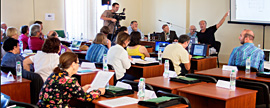Regulations
of the International Research Center for Traditional Polyphony of V. Sarajishvili Tbilisi State Conservatoire
I.General:
I.1. Considering the significance of traditional polyphony in Georgian culture and its place in world polyphony, on the initiative of Georgian specialists, with the support and unanimous consent of world renowned ethnomusicologists International Research Center for Traditional Polyphony (hereinafter the Center) was founded at V. Sarajishvili Tbilisi State Conservatoire basing on the resolution (record #3) from 5 November 2002, with the Rector’s order #3/1 from 1February, 2003.
I.2. The Center is a structural unit of the Conservatoire, has Director, uses letterhead and seal of the Conservatoire, and has its own title-page and logo;
I.3. The Center’s activity is closely connected with the activities of the Georgian Folk and Church Music laboratories of the Conservatoire.
II. The Center aims to:
II.1. Support the study of polyphony as a category of musical thinking;
II.2. Expand the borders of ethnomusicological research in terms of ethnological, cultural-anthropological, social, philosophical-aesthetic, psycho-physiological aspects, to carry out joint researches together with representatives of adjacent scientific disciplines;
II.3. Make the results of contemporary study accessible for wider circles;
II.4. Present the peculiarities of regional styles of world polyphony and the place of Georgian polyphony in this context;
II.5. Support intercultural dialogue in order to preserve world cultural diversity and originality.
III. The Center’s objectives are:
III.1. To expand collaboration with International ethnomusicological organizations (ICTM and ESEM), take active part in the ethnomusicological life of scientific-research centers for traditional music and phonogram archives in Georgia and elsewhere; actively participate in world ethnomusicological life;
III.2. To create world map for the geographical distribution of traditional polyphony supplied with scientific comments;
III.3. To hold biannual international symposia on traditional polyphony in order to stimulate the research of world polyphony;
III.4. To upload the symposium proceedings on the Web Site for wider accessibility;
III.5. To prepare and publish semi-annual online Georgian-English bulletin reflecting ethnomusicological life in Georgia;
III.6. To support translation of ethnomusicological publications in Georgian and foreign-languages and carry out publishing activities via collaboration with publishing centers in Georgia and abroad;
III.7. To support the presentation of Georgian polyphony on international arena via presenting Georgian and foreign scholars’ papers at Tbilisi International symposia and participation of Georgian scholars in international ethnomusicological forums.
III.8. To study the evolution processes of traditional polyphonic thinking in the 20th century and current state of Georgian polyphony and that of the peoples residing in Georgia basing on archival audio and historical-ethnographic data; organize field-expeditions for this purpose and provide scientific generalization of their results;
III.9. To establish contacts with the centers of Georgian and Caucasian polyphony outside Georgia; carry out preliminary prospective activities for subsequent expeditions and comparative ethnomusicological study;
III.10. To suggest a one-year course in Georgian folk music to foreigners to arouse foreign scholars’ interest the study of Georgian music;
III.11. To realize various local and international projects;
III.12. To permanently improve the Center’s Web Site www.polyphony.ge and supplement it with new essential information.
IV. The Center’s structure:
IV.1. The Center is a structural unit of Tbilisi State Conservatoire, with Director, Deputy Director and specialists; the staff changes according to the objectives and the Conservatoire Rector’s order;
IV.2. The Center has an international bureau, which establishes and intensifies international contacts, and is actively involved in the preparation of symposia and publishing activities;
IV.3. The Center is headed by Director – appointed by the Rector;
IV.4. For its activities the Center is accountable to the Conservatoire Rector and Senate.
V. The Center’s Human Resources:
For the realization of its objectives the Center basically uses its resources, collaborates with the academic personnel, specialists, employees of Georgian Folk and Church Music laboratories of the Conservatoire, invites representatives of other branches on contract basis.
VI. The Center’s property and finances:
VI.1. The Center’s property belongs to the Conservatoire, regardless of the fact with whose finances it has been purchased;
VI.2. The Center is financed by the Conservatoire from its intended budget and non-budget sums, including grants, donations, sums obtained from publishing activities according to the ascertained rules;
VI.3. Non-budget (and other) income purposefully drawn for the Center is directed by the Conservatoire as presented by the Center.
VII. Abolition of the Center:
VII.1. The Center can be abolished according to the decision of the Conservatoire Senate, Rector’s order;
VII.2. Regulations of the Center and changes in it are affirmed on the decision of the Conservatoire Artistic Council.




